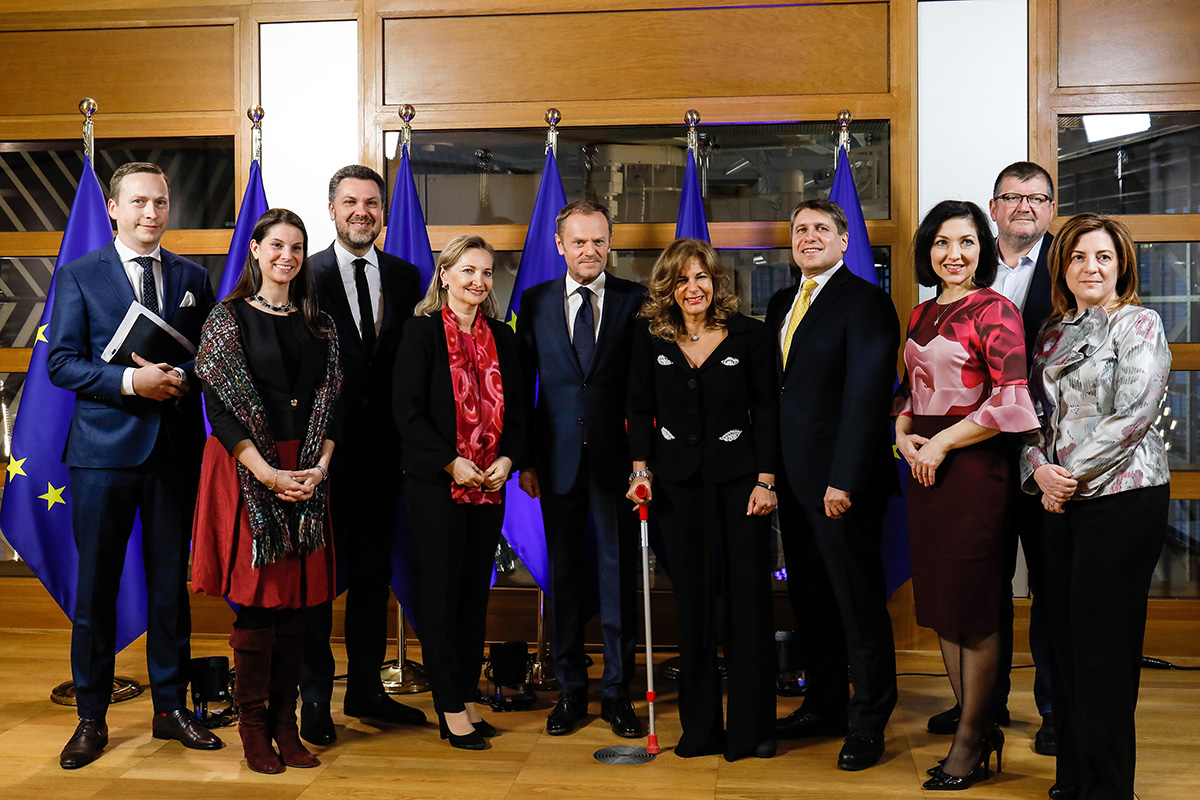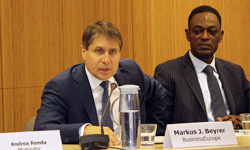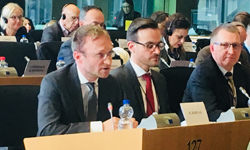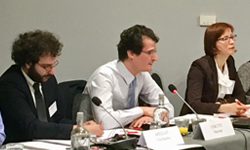BusinessEurope Headlines No. 2018-11
Tripartite Social Summit: social partners call for MFF decisions before the European elections

Speaking at the Tripartite Social Summit on 21 March 2018 in Brussels, on the eve of the Spring European Council, BusinessEurope's President Emma Marcegaglia stressed that “in today’s challenging world, it is more important than ever to make sure that our social market economy continues to thrive. 2017 has been a good year for the EU economy, but in a situation where the US introduce a tax reform, which will boost their national investments, and Europe is facing an aggressive Chinese approach via their Belt and Road Initiative (BRI), the EU must urgently take action to maintain its economic position in the world. The EU must make sure the post-2020 Multiannual Financial Framework (MFF) is in place before the European elections. We also need to be ambitious on trade agreements, on the Single Market, on digitalisation, on industrial policy, on the Capital Markets and Banking Unions and on further strengthening our public finances”. Speaking on labour markets reforms, President Marcegaglia stressed that “skills shortages are at their highest level in over 20 years, posing a real risk that the falls in unemployment will soon slow. Labour markets and skills are therefore a key priority for reforms in 2018. In addition to tackling skills mismatches which create bottlenecks to growth, we must facilitate labour market participation of all. For that we need diverse forms of employment. And we must reduce non-wage labour costs, through targeted cuts in the tax wedge”. During her intervention, Ms Marcegaglia also conveyed the clear messages on Brexit and US tariffs emphasised in BusinessEurope's letter to the Spring European Council, which was discussed at the preparatory dinner of the social partners with the European Council President Tusk on 20 March.
![]()
![]() Contact: Maxime Cerutti
Contact: Maxime Cerutti
Video message on the Reform Barometer 2018
BusinessEurope's Reform Barometer 2018 analyses how globally competitive the EU is now compared to the eve of the financial crisis, ten years ago. It also evaluates if and how the European Commission's recommendations for reforms were really brought forward.
Our comment
Brexit- why transition is important
By Luisa Santos, Director for International Relations

This week Brexit negotiators have reached a political agreement on the main elements of the withdrawal agreement, including a transition period foreseen to last until December 2020. This agreement still needs to be confirmed by the European Council on 22-23 March and some elements need further negotiation but overall this is a positive step.
After many months of little progress casting a shadow of uncertainty in the business community, we welcome the fact that both sides acknowledge and agree on having a transition period after the UK leaves the EU in March 2019. This has been a long-standing request from business, as companies need time to prepare and adjust to the post-Brexit situation.
Regardless of what kind of model will govern the future EU-UK relations, there will be changes and these will have an impact on day-to-day business operations. Customs related issues are a good example. For instance, we can expect changes on administrative procedures with repercussions on human resources or IT systems. Companies will need time to fully grasp the changes and make the necessary adjustments.
Therefore, a “status quo-like” solution with the UK remaining in the customs union and the Single Market with all rights and obligations of the EU acquis for the duration of the transition period is the best option. First, it provides business and citizens the necessary time to adjust; second, it provides more certainty and predictability; and third, it ensures a level playing field for companies.
Companies will have limited time to make the necessary changes. However, we trust the transition period will allow companies to map their business operations, understand better the potential impact of Brexit in their relations with major suppliers and customers and adjust if necessary. Since the UK will remain in the Customs Union and the Single Market during transition, companies will start experiencing changes as the UK will no longer be part of the EU but these will be limited.
Of course, at this stage there is still plenty of uncertainty. We don’t know what the future EU-UK relation will look like and until we have an agreement in place a “cliff edge” scenario cannot be excluded.
Some months ago, transition or implementation as the UK Government prefers to call it, was not even on the table. Through joint efforts the business community in the EU and the UK have managed to put this concept at the forefront of the discussions. This shows how the business community can play a key role in these negotiations by raising potential problems and providing constructive solutions.
Contact: Luisa Santos
Joint event on Artificial Intelligence, Robotics and Machine Learning
 BusinessEurope organised a roundtable in association with the Information Technology Industry Council (ITI) on Artificial Intelligence (AI) on 21 March 2018. Bjoern Juretzki, assistant to Roberto Viola, Director General of the European Commission’s Directorate General of Communication, Networks, Content and Technology, was present to discuss the Commission’s upcoming 3rd data and AI packages. Permanent Representations to the EU were also at the event to take part in a series of sessions that covered ethical questions in relation to the roll out of AI such as: liability, transparency, privacy, security and the future of work. Several national associations and company members were present to share their views on how Europe can overcome these challenges and derive the full economic and societal benefits from AI. Director General of BusinessEurope, Markus J. Beyrer also displayed our interest in joining the European AI Alliance that the Commission is beginning to set up. We will actively follow the debate on artificial intelligence as we continue to remain a responsible stakeholder.
BusinessEurope organised a roundtable in association with the Information Technology Industry Council (ITI) on Artificial Intelligence (AI) on 21 March 2018. Bjoern Juretzki, assistant to Roberto Viola, Director General of the European Commission’s Directorate General of Communication, Networks, Content and Technology, was present to discuss the Commission’s upcoming 3rd data and AI packages. Permanent Representations to the EU were also at the event to take part in a series of sessions that covered ethical questions in relation to the roll out of AI such as: liability, transparency, privacy, security and the future of work. Several national associations and company members were present to share their views on how Europe can overcome these challenges and derive the full economic and societal benefits from AI. Director General of BusinessEurope, Markus J. Beyrer also displayed our interest in joining the European AI Alliance that the Commission is beginning to set up. We will actively follow the debate on artificial intelligence as we continue to remain a responsible stakeholder.
Contact: Patrick Grant
Structured EU-Africa dialogue for a better investment climate
 “A strong structured dialogue between European and African public and private sectors on the ground is decisive to improve the investment climate and enhance value chains in Africa”, said Luisa Santos, Director for International Relations at BusinessEurope, at the 5th Workshop with Private Sector in the Framework of the Policy Forum for Development. The event, which took place on 20 March 2018 in Brussels, brought together European Commission officials and representatives from enterprises and private sector organisations to discuss the state of play of the EU’s External Investment Plan (EIP). One of the main goals of the European Commission Directorate General for Development and Cooperation, which organised the conference, was to get more input on the main obstacles that European investors face in Africa. The EIP, which aims to leverage more than €44 billion of investment in Africa and the EU neighbourhood by 2020, is composed of three pillars. While the first one concerns the fund itself, the second pillar, Technical Assistance, aims to develop financially attractive projects and help attract investments and the third pillar seeks to improve the investment climate through better governance and engagement with the private sector through the Sustainable Business for Africa Platform, amongst other things. The first projects are expected to be launched by the middle of this year.
“A strong structured dialogue between European and African public and private sectors on the ground is decisive to improve the investment climate and enhance value chains in Africa”, said Luisa Santos, Director for International Relations at BusinessEurope, at the 5th Workshop with Private Sector in the Framework of the Policy Forum for Development. The event, which took place on 20 March 2018 in Brussels, brought together European Commission officials and representatives from enterprises and private sector organisations to discuss the state of play of the EU’s External Investment Plan (EIP). One of the main goals of the European Commission Directorate General for Development and Cooperation, which organised the conference, was to get more input on the main obstacles that European investors face in Africa. The EIP, which aims to leverage more than €44 billion of investment in Africa and the EU neighbourhood by 2020, is composed of three pillars. While the first one concerns the fund itself, the second pillar, Technical Assistance, aims to develop financially attractive projects and help attract investments and the third pillar seeks to improve the investment climate through better governance and engagement with the private sector through the Sustainable Business for Africa Platform, amongst other things. The first projects are expected to be launched by the middle of this year.
Contact: Benedikt Wiedenhofer
BusinessEurope speaks out in support of the Goods Package
 BusinessEurope supports the Goods Package and welcomes the European Commission’s efforts to improve free movement of goods in the Single Market and to create a level playing field. This was the main message of Martynas Barysas, Director of BusinessEurope’s Internal Market Department, on 21 March 2018 during a public hearing on the package in the European Parliament Committee on the Internal Market and Consumer Protection (IMCO). “In the area of mutual recognition, we appreciate the possibility to use SOLVIT as a problem-solving tool; however, we should make sure that it really works and is backed by adequate resources”, Barysas stated, adding that “In the area of compliance and enforcement, while strong enforcement is necessary, it is also key to ensure that the powers of market surveillance authorities are used in a proportionate and uniform manner”. BusinessEurope is currently in the last stage of adopting a position paper on the Goods Package.
BusinessEurope supports the Goods Package and welcomes the European Commission’s efforts to improve free movement of goods in the Single Market and to create a level playing field. This was the main message of Martynas Barysas, Director of BusinessEurope’s Internal Market Department, on 21 March 2018 during a public hearing on the package in the European Parliament Committee on the Internal Market and Consumer Protection (IMCO). “In the area of mutual recognition, we appreciate the possibility to use SOLVIT as a problem-solving tool; however, we should make sure that it really works and is backed by adequate resources”, Barysas stated, adding that “In the area of compliance and enforcement, while strong enforcement is necessary, it is also key to ensure that the powers of market surveillance authorities are used in a proportionate and uniform manner”. BusinessEurope is currently in the last stage of adopting a position paper on the Goods Package.
Contact: Basje Bender
Towards a genuine partnership for labour market reforms
 “Labour market reforms and skills adaptation are key priorities. The EU and its Member States need to address growing skills shortages. They need to improve the functioning of the labour markets. They need to ensure the sustainability of social protection systems.” This was the key message of BusinessEurope Social Affairs Director Maxime Cerutti during the annual seminar organised by the European social partners to discuss social partners’ involvement in economic governance processes and the European semester, held in Brussels on 14 March 2018. “The European semester is rightly seen as the main policy vehicle to implement the European pillar of social rights. Improving social partners involvement in the European semester process as part of a reform partnership will be important to increase ownership and implementation of the necessary reforms”, Cerutti added.
“Labour market reforms and skills adaptation are key priorities. The EU and its Member States need to address growing skills shortages. They need to improve the functioning of the labour markets. They need to ensure the sustainability of social protection systems.” This was the key message of BusinessEurope Social Affairs Director Maxime Cerutti during the annual seminar organised by the European social partners to discuss social partners’ involvement in economic governance processes and the European semester, held in Brussels on 14 March 2018. “The European semester is rightly seen as the main policy vehicle to implement the European pillar of social rights. Improving social partners involvement in the European semester process as part of a reform partnership will be important to increase ownership and implementation of the necessary reforms”, Cerutti added.
Contact: Guillaume Cravero
Upcoming New Deal for Consumers should remain balanced
 Participating as a guest speaker at a meeting of BusinessEurope’s Legal Affairs Committee on 21 March 2018, Francisco Fonseca Morillo, Deputy Director General of the European Commission Directorate General for Justice, gave an overview of the upcoming Commission plans in the consumer area. The EU Consumer REFIT exercise showed that EU consumer rules are fit for purpose. Therefore, BusinessEurope warns against creating a new unnecessary layer of rules which will simply discourage companies to engage in e-commerce. The New Deal will most probably include an EU judicial collective redress measure. Although not convinced about the need of such instrument, BusinessEurope urges the European Commission to ensure that a minimum standard of procedural guarantees is included so that frivolous and unmerited law suits can be prevented.
Participating as a guest speaker at a meeting of BusinessEurope’s Legal Affairs Committee on 21 March 2018, Francisco Fonseca Morillo, Deputy Director General of the European Commission Directorate General for Justice, gave an overview of the upcoming Commission plans in the consumer area. The EU Consumer REFIT exercise showed that EU consumer rules are fit for purpose. Therefore, BusinessEurope warns against creating a new unnecessary layer of rules which will simply discourage companies to engage in e-commerce. The New Deal will most probably include an EU judicial collective redress measure. Although not convinced about the need of such instrument, BusinessEurope urges the European Commission to ensure that a minimum standard of procedural guarantees is included so that frivolous and unmerited law suits can be prevented.
Contact: Pedro Oliveira
Fostering the power of responsible Artificial Intelligence roll-out
 Trust in the digital economy will be achieved if the consumers of innovative technologies have transparency on the products they purchase. Investing in cybersecurity and favouring privacy through preparing to apply the General Data Protection Regulation (GDPR) are also essential elements. These were key messages that BusinessEurope’s Digital Economy Adviser, Patrick Grant, gave at the European Economic and Social Committee’s (EESC) European Consumer Day in Sofia, Bulgaria, on 20 March 2018. Participating in a panel on digital opportunities, Grant delivered a presentation on fostering the power of responsible roll-out of Artificial Intelligence (AI) and the opportunities it will bring for the digital consumer. BusinessEurope looks forward to continuing to cooperate with all stakeholders in order to make AI roll out a success for all.
Trust in the digital economy will be achieved if the consumers of innovative technologies have transparency on the products they purchase. Investing in cybersecurity and favouring privacy through preparing to apply the General Data Protection Regulation (GDPR) are also essential elements. These were key messages that BusinessEurope’s Digital Economy Adviser, Patrick Grant, gave at the European Economic and Social Committee’s (EESC) European Consumer Day in Sofia, Bulgaria, on 20 March 2018. Participating in a panel on digital opportunities, Grant delivered a presentation on fostering the power of responsible roll-out of Artificial Intelligence (AI) and the opportunities it will bring for the digital consumer. BusinessEurope looks forward to continuing to cooperate with all stakeholders in order to make AI roll out a success for all.
Contact: Patrick Grant
Comparability of qualifications is enhanced when they are structured around labour market needs
 “Employers reward performance, rather than qualifications, and they need to be sure that education and training systems are reliable, trustworthy and oriented around labour market needs”. This was the key message by Maxime Cerutti, BusinessEurope Director of Social Affairs, at the tenth anniversary conference of the European Qualifications Framework (EQF) on 16 March 2018 in Brussels. The EQF aims to foster the comparability and transparency of qualifications across the EU, covering qualifications that are acquired through general education as well as vocational education and training. BusinessEurope considers that the next phase of the EQF should focus on further developing an approach focused on learning outcomes for all types of academic or vocational qualifications, as part of European and national qualification frameworks.
“Employers reward performance, rather than qualifications, and they need to be sure that education and training systems are reliable, trustworthy and oriented around labour market needs”. This was the key message by Maxime Cerutti, BusinessEurope Director of Social Affairs, at the tenth anniversary conference of the European Qualifications Framework (EQF) on 16 March 2018 in Brussels. The EQF aims to foster the comparability and transparency of qualifications across the EU, covering qualifications that are acquired through general education as well as vocational education and training. BusinessEurope considers that the next phase of the EQF should focus on further developing an approach focused on learning outcomes for all types of academic or vocational qualifications, as part of European and national qualification frameworks.
Contact: Robert Plummer
Calendar
- 22-23 March: Spring European Council
- 8 April: Hungarian elections
- 10 April: 3rd Low Emission Package
- 10 April: Digital Day
- 11 April: Legislative proposal on whistle blowing